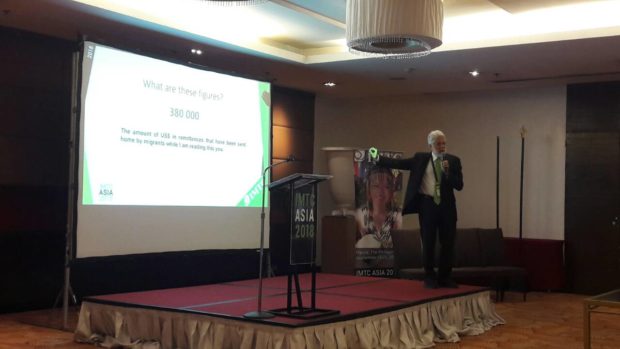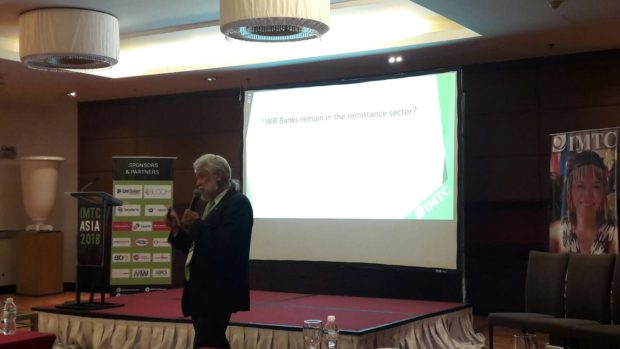IMT Asia 2018 explores trends, incentives, and de-risking schemes of the Money Transfer and Payment Industry
Executives from International Money Transfer and Cross-Border Payment institutions, Philippine banks, and other financial service providers gathered for the second International Money Transfer & Cross-Border Payment Conference (IMTC) in Asia, last September 19 to 21 at the Crowne Plaza Galleria.
During the three-day seminar, attendees had a better understanding of the status, opportunities, challenges, and expectations facing the remittance industry today.
In case you missed the three-day event last September, here’s a breakdown of the topics that were discussed during its run:
On Industry Trends and Incentives
On the first day of the conference, IMTC Conferences Director Hugo Cuevas-Mohr discussed the various trends and incentives affecting the industry today. According to him, the Philippines continues to grow in remittance because of the effects on migration and the work done by Overseas Filipino Workers (OFW).
“There are very few countries in the world that have sustained a continuous increase in remittances like this (Philippines). And I think this is really because of the work done by the overseas workers. Because they are trained in their jobs, they earn more money [and thereby, are more induced to avail of remittances]” Cuevas-Mohr explains.
However, the country’s current status does not secure a continuous growth in remittance rates. Cuevas-Mohr says that the increase or decrease in number will depend also on the status of the Philippine economy.
“If a country experiences difficulties in their economy, then remittances can either increase or decrease,” he adds.
The Role of Banks in Remittance
Banks play a pivotal role when it comes to the remittance sector. In the Philippines, Cuevas-Mohr reports that 62.8% of the country’s remittance come from banking institutions. He further adds that banks will continue to thrive in this industry as long as there is revenue from the payment of remittances and revenue from the sale of US Dollars.
Though, he notes that banks should also consider adjusting their platforms to today’s evolving technological landscape. As Cuevas-Mohr remarks, “change is coming for banks [with regards to the remittance industry.]”
Mitigating the Effects of De-risking in the Fund Transfer Industry
George Innocencio from the Association of Bank Remittance Offices, Inc. also shared his insights on an important issue affecting the industry today – mitigating the effects of de-risking.
Innocencio says the possible impact of de-risking includes the following: 1) loss of competition if money service businesses (MSB) or money transfer operators (MTO) are excluded due to account closures, 2) higher operating costs to maintain compliance gets passed on to customers in terms of higher fees, 3) exchange of unbanked migrant workers, 4) possible loss of remittance value received by beneficiaries.
But Innocencio reveals that through financial inclusion, progressive regulatory framework, MSB Compliance Standard and Capacity Building, industry utilities for knowing your customers (KYC), and new business models or bypassing the financial centers, it is possible to mitigate the impact of de-risking in the fund transfer industry.
Later in the conference, these topics were further elaborated during the roundtable discussions and panel meetings between the attendees and the keynote speakers.
Overall, IMTC was a successful seminar that brought together industry practitioners and executives to learn from one another. And IMTC Conferences Director Hugo Cuevas-Mohr is excited to share his thoughts on the future of the remittance industry in the country.
“I am very thankful for the Filipino Remittance Sector for the support and participation in this international forum that we have brought to the country to encourage the development of the new technologies and their regulation that are little by little impacting the cost and efficiency of the service to the Filipino families that depend on this service for the welfare of their families. New developments in the Philippines such as Fast Payments (PesoNet, etc.), the National ID scheme, Blockchain Networks, etc, will undoubtedly keep the country in the forefront of the industry. With more than 10% of GDP coming from this sector and a 4% growth year-to-year, we feel very positive about remittances to the Philippines. We are encouraging Filipino institutions to participate in the coming IMTC WORLD 2018 so the world can witness the advances the country has been implemented in this sector.”
INQUIRER.net BrandRoom/Francesca Militar

